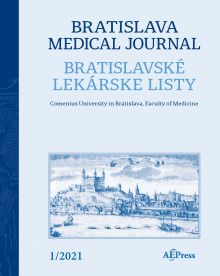Journal info
|
||||
Select Journal
Journals
Bratislava Medical Journal 2024 2023 2022 2021 2020 2019 2018 2017 2016 2015 2014 2013 2012 Ekologia - Ecology Endocrine Regulations General Physiology and Biophysics Neoplasma Acta Virologica Studia Psychologica Cardiology Letters Psychológia a patopsych. dieťaťa Kovove Materialy-Metallic Materials Slovenská hudba 2025Webshop Cart
Your Cart is currently empty.
Info: Your browser does not accept cookies. To put products into your cart and purchase them you need to enable cookies.
Bratislava Medical Journal Vol.124, No.10, p.748–751, 2023 |
||
| Title: A single-centre report of acute pyelonephritis in a patient after kidney transplantation – analyses of risk factors | ||
| Author: Igor GALA, Tatiana BALTESOVA, Stefan HULIK, Rastislav KALANIN, David ADANDEDJAN, Jana KATUCHOVA, Luboslav BENA | ||
| Abstract: BACKGROUND: Urinary tract infections (UTI) are the most common infectious complications after kidney transplantation (KTx) with highest incidence in the first three months of transplantation. UTI in transplant recipients increase morbidity and mortality, risk of graft failure and incidence of acute rejection episodes. According to published data, urinary tract infections significantly affect graft survival. The aim of our study was to identify possible risk factors for the development of UTI. MATERIAL AND METHODS: We retrospectively analyzed a cohort of patients who received kidney transplantation between January 2014 and December 2016 in the Transplant Center of Louis Pasteur University Hospital in Košice. One hundred and fifty-three patients after kidney transplantation were included in the study. RESULTS: A total of 47 Caucasian patients (30%) developed UTI, namely – acute pyelonephritis after KTx. We identified independent risk factors associated with UTI such as female gender OR (7.98, 95% CI 2.88–22.12, p < 0.001), diabetes mellitus (OR 5.26, 95% CI 2.01–13.74, p = 0.001; 95% CI 4.57–53.82, p < 0.001) urologic complication (OR 15.68, 95% CI 4.57–53.82; p < 0.001) and acute rejection episode (OR 3.15, 95% CI 1.13–8.76, p = 0.027). The most common microbiological agent was Escherichia coli. CONCLUSION: We identified the aforementioned risk factors of urinary tract infections in the files of our patients. Statistically, the most significant risk factors are the female gender, and presence of urological complications. The urological complications and BMI of the patients are considered modifiable factors. Based on our analysis, we confirmed a significantly higher number of ACR patients who overcame infection which is in accordance with the published data on association of UTI with the development of acute cellular rejection (ACR) (Tab. 2, Fig. 1, Ref. 15). |
||
| Keywords: acute pyelonephritis, kidney transplantation, risk factors, urinary tract infections | ||
| Published online: 07-Aug-2023 | ||
| Year: 2023, Volume: 124, Issue: 10 | Page From: 748, Page To: 751 | |
| doi:10.4149/BLL_2023_114 |
||
|
|
 download file download file |
|

